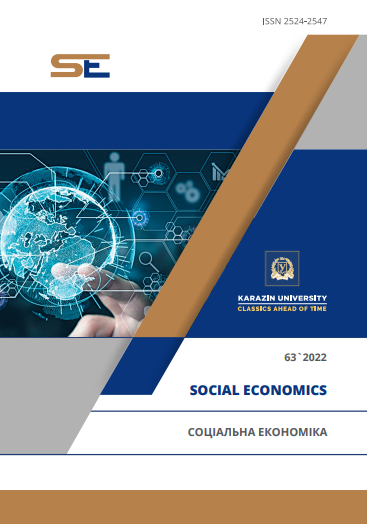ЕТИЧНІ АСПЕКТИ ПОВЕДІНКИ ДЕРЖАВНИХ СЛУЖБОВЦІВ
Анотація
У статті проаналізовано проблеми конфлікту інтересів державних службовців. Значення дослідження полягає в тому, що на даний момент етичні норми державної служби є типом управлінської етики, на основі яких досліджується професійна мораль державних службовців, ціннісні орієнтації, етичні норми, моральні аспекти. Обґрунтовані основні аспекти поведінки та взаємозв’язки між людьми в процесі державної та управлінської роботи. Мікроетика державного службовця виявляє характерні вимоги до моралі державних службовців, пов’язаних з характерною рисою професії, її інституційними, організаційними та індивідуальними етичними компонентами.
Професійна етика повинна характеризувати найвищу культуру в роботі абсолютно всіх зв’язків у державному апараті управління. Етичні норми державного службовця обґрунтовують універсальні моральні настанови. Гармонізація вимог загальної моралі також можлива через форму та методи незалежного моніторингу роботи окремих фахівців та групи професіоналів в цілому. Визначення та точне формулювання місії держслужби є основою для побудови відповідної системи професійної етики державних службовців і фактором надання моральних відносин між владою та громадянами. Принцип служіння людям вважається семантичним стрижнем, навколо якого слід побудувати концепцію професійних ціннісних орієнтирів державних службовців. Державна служба формує стандарти поведінки у спілкуванні з громадянами, представниками різних установ та організацій, поведінки у спілкуванні, а саме спілкування з особливою повагою, доброзичливістю, з розумінням, об’єктивністю, формування ділових відносин між посадовими особами з представниками влади, делегаціями зарубіжних країн. Звичайно, основними орієнтирами демократичної державної служби повинні бути такі принципи, як: єдність, надійність, пошана людини.
Завантаження
Посилання
Vasylevska, T. E. (2011). Ethical aspects of reforming the civil service. Democratic governance: an electronic scientific professional publication, 7. Retrieved from http://www.lvivacademy.com/visnik7/fail/vasylevska.pdf. (in Ukrainian)
Dragomiretska, N. M. (2015). Suchasni tendentsii komunikatsii u suchasnomu sviti [Modern trends in communications in the modern world]. Publichne uriaduvannia - Public Governance, 1 (1), 85-97. Kyiv: DP Vydavnychyi dim «Personal». (in Ukrainian)
Vasylevska, T. E. (Ed.). (2015). Ethics of public administration: a textbook. Kyiv : National academy of public administration. (in Ukrainian)
Goshovska, V. A. (2013). Language policy in Ukraine. Kyiv: National academy of public administration. (in Ukrainian)
Goshovska, V. A., & Polishchuk, I. V. (2015). Components of the professional potential of the civil servant: teaching method. Kyiv: National academy of public administration. (in Ukrainian)
Goshovska, V. A. (Ed.). (2016). Communications in public administration: aspects of organizational culture and business communication. Kyiv: K.I.S. (in Ukrainian)
Malimon, V. I., & Shevchenko, N. P. (2015). Actualization of ethical codes in the context of modernization of public administration. Scientific and information bulletin, 11/2015. Retrieved from https://visnyk.iful.edu.ua/wp-content/uploads/2019/02/11-13-15.pdf. (in Ukrainian)
Panfilova, T. O. (2011). Ethics of public administration: guidelines. Lviv: LRIDU NADU. (in Ukrainian)
Rudakevych, M. I. (2003). Ethics of civil servants. Kyiv: National academy of public administration. (in Ukrainian)
Rudakevych, M. I. (2007). Professional ethics of civil servants: theory and practice of formation in terms of democratization of public administration. Ternopil: Publishing house ASTON. (in Ukrainian)
Peachment, A., McNeil, M., Soutar, G. et al. (1995). Means or ends? Ethical decision frameworks in the Western Australian Public Service. J Bus Ethics, 14, 629–641. doi: https://doi.org/10.1007/BF00871344.
Hanbury, G. L. (2004). A “Pracademic’s” Perspective of Ethics and Honor: Imperatives for Public Service in the 21st Century! Public Organization Review, 4, 187–204. doi: https://doi.org/10.1023/B:PORJ.0000036867.85186.09.
Ashkanasy, N. M., Falkus, S. & Callan, V. J. (2000). Predictors of Ethical Code Use and Ethical Tolerance in the Public Sector. Journal of Business Ethics, 25, 237–253. doi: https://doi.org/10.1023/A:1006001722137.
Sorokina, N. G. (2017). Analysis of the basic requirements for the ethical behavior of civil servants in Ukraine: legal aspect. Aspects of public administration, 5, 1-2 (39-40), 13-18. (in Ukrainian)
Hoekstra, A. (2016). Institutionalizing Integrity Management: Challenges and Solutions in Times of Financial Crises and Austerity Measures. The Routledge Companion to Ethics and Public Service Organizations.
Huberts, L., & Hoekstra, A. (2016). Integrity Management in the Public Sector: The Dutch Approach The Dutch National Integrity Office. Retrieved from https://www.government.nl/documents/reports/2016/01/18/integrity-management-in-thepublic-sector-the-dutch-approach.
Fleming, J. (2000). Motivating ethical conduct in government ministers. International Institute for Public Ethics Conference, Ottawa, September, № 1.
Beck, J. T., & Sørensen, D.-L. (2013). Codes of good governance: national or global public values? Public Integrity, 15(1), 71–95. Retrieved from https://www.researchgate.net/publication/273340108_Codes_ of_Good_Governance.
Schminke, M. (Eds.). (2010). Managerial Ethics. Routledge, New York.
Behncke, N. (2005). Ethics as Apple Pie: The arms race of ethical standards in congressional and presidential campaigns. EGPA-Paper, «Ethics and Integrity of Governance: A transatlantic dialogue», Leuven, June 2005.
Demmke, Ch., & Moilanen, T. (2012). Effectiveness of Public – Service Ethics and Good Governance in the Central Administration of the Eu-27. Peter Lang, Frankfurt.
Sandel, M. (2009). Justice: What’s the Right Thing to Do? New York: Farrar, Straus and Giroux.
Stefan Batory Foundation. (2014). The conflict of interest in the Polish government administration. Warsaw.





